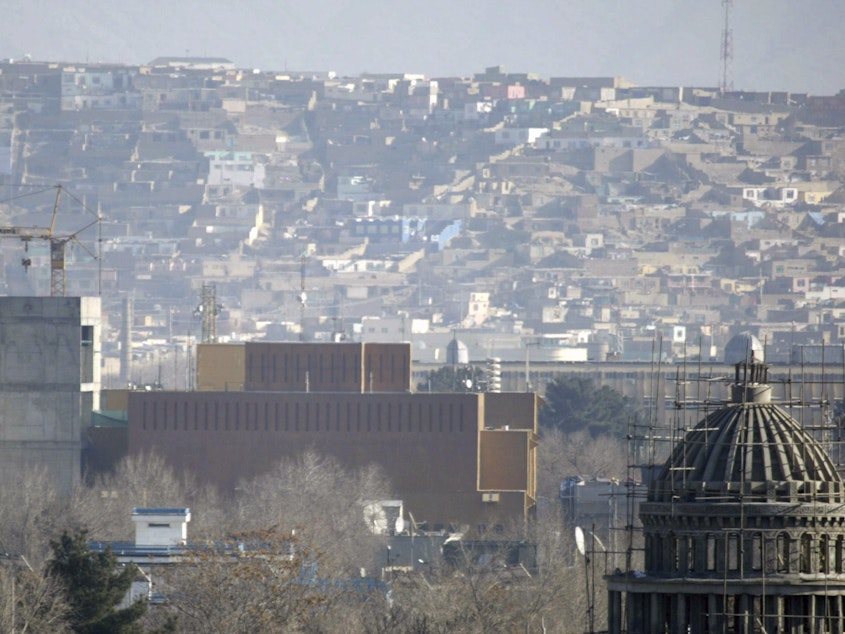State Department Orders Departure Of Nonessential Personnel From Kabul Embassy

The State Department is downsizing the U.S. embassy in Kabul, ordering some nonessential personnel to leave amid concerns about heightened violence as U.S. and NATO troops pull out of Afghanistan.
Updated April 27, 2021 at 4:21 PM ET
The department "ordered the departure from U.S. Embassy Kabul of U.S. government employees whose functions can be performed elsewhere," it noted in a travel advisory issued Tuesday.
U.S. officials would not confirm the number of embassy personnel departing, but insisted it would be small and that all offices and services will remain open at the embassy.
"This does not reflect the diminution of our diplomatic engagement in Afghanistan," a State Department official tells NPR. He did not want to be identified because he was not authorized to speak on the record about the embassy departures. "I would call it a reposturing so that we can prepare for the departure of troops in a prudent manner while continuing our diplomatic priorities in country."
Sponsored
The Biden administration recently announced that all U.S. troops will leave by Sept. 11, the 20th anniversary of al-Qaida's attacks that led to the U.S. invasion of Afghanistan in 2001.
The departing diplomats will continue to do their work remotely.
"As we've all discovered during COVID days, we are able to telework more effectively than we ever imagined. That's what we're going to be looking at doing," the official says.
State Department officials say they will have to find alternatives to medical evacuation and other services that the U.S. military had been providing embassy employees.
"There are a number of security-related things that the military has provided previously, and as they depart, we need to take those functions as best we can," says the official.
Sponsored
There are roughly 3,500 U.S. and 7,000 NATO troops currently in Afghanistan. As they leave in the weeks and months ahead, there are growing fears of a security vacuum in the country.
Kabul is already wracked by assassinations that have targeted journalists, human rights activists, judicial workers, doctors and clerics. The United Nations estimates that 700 people were murdered in targeted killings last year.
There are fears that the Taliban will continue to step up attacks, despite an agreement the U.S. and Taliban signed last year in which the Taliban agreed not to do so.
"The U.S. government does not have a lot of faith in the Afghan government to hold ground," says Asfandyar Mir, a postdoctoral fellow at the Center for International Security and Cooperation at Stanford University.
He points out that U.S. Central Command Gen. Kenneth F. McKenzie, Jr., recently warned that the Afghan military will collapse without American support after U.S. troops withdraw.
Sponsored
Mir believes that the embassy reduction induces uncertainty about the continuity of U.S. support and aid to Afghanistan.
"More significantly," he says, "I think there's a big question over whether the U.S. will come to come to the aid of Afghans in the case of immediate contingencies — say, a situation in which the Taliban try to press their military advantage."
Lawmakers were able to ask questions and raise concerns on Tuesday afternoon, when Zalmay Khalilzad, the special representative for Afghanistan reconciliation, testified before the Senate Committee on Foreign Relations in the body's first public hearing since the drawdown was announced.
Khalilzad said in his opening remarks that the U.S. will withdraw its troops "responsibly, deliberately and safely," and discussed its plans to continue providing support to the country in other ways, including diplomatically, during the ongoing negotiations and in the form of security assistance to Afghan military and police. It will also continue to provide development assistance and advocate for the rights of women and other vulnerable groups, he added.
Senators on both sides of the aisle went on to press him on topics including the status of those negotiations, what counterterrorism operations will look like without an on-the-ground presence and what sort of preparations are being made to help Afghans who assisted the U.S. and may soon need to leave the country.
Sponsored
They also asked about a number of potential scenarios, such as what the U.S. would do if the Taliban once again rose to power.
Khalilzad said at one point that he does not "personally believe that there will be an imminent collapse," though he noted that others disagree. He said the choice Afghans face is between a negotiated political settlement and "a long war." [Copyright 2021 NPR]
